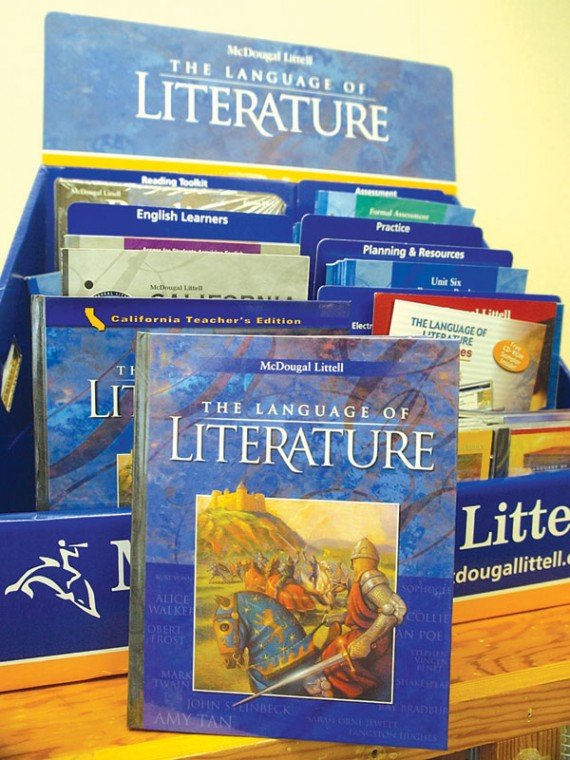GILROY
– Reading and language scores of Gilroy High School students
could be on the rise next year due to proposed changes in the
English program.
GILROY – Reading and language scores of Gilroy High School students could be on the rise next year due to proposed changes in the English program.
For the first time, students at GHS across all four grade levels and in nearly every course will get English textbooks and a new instructional program. English Department Chair Peter Gray told parents Tuesday night that staff is working on the details for how they will use the new textbooks next year.
Based on what teachers already experienced while giving the books a three-month trial run, Gray predicted that once the English curriculum changes are in place, progress should be evident in students’ test scores.
Improvement is heavily sought after in Gilroy Unified School District. More than 56 percent of GHS freshmen through juniors did not score high enough on English-language arts tests last year to be considered proficient by the state.
“After a semester of using the books, these kids’ (test) scores should be steadily going up because this will give them those skills that they’re lacking,” Gray said.
GHS English teachers chose to test, or pilot, textbooks from publishers McDougal Littell and Prentice Hall after seeing presentations from four companies late last year. Twelve teachers participated in the pilot, six for each book, across all course levels.
They were trained by the publishers’ representatives in using the textbooks and chose similar lessons to compare them better. When put to an anonymous vote last month, 11 of the teachers favored McDougal Littell as more comprehensive and engaging for students.
In a change from past proposals, Principal Bob Bravo said the district will purchase textbooks for ninth through 12th grades. They will be used primarily in all general classes, as well as in Honors and Advanced Placement classes.
The district will pay about $170,000 over two years for roughly 2,000 books from the high school’s materials fund.
The McDougal Littell and Prentice Hall books had mostly the same content, but teachers thought McDougal did a better job of meeting both advanced and struggling students’ needs, provided better supplementary materials, better writing and grammar materials and a superior teacher’s guide and instructional planning tools.
For Gray, who piloted the Prentice Hall textbook, the light bulb turned on when he saw the McDougal Littell textbook in action. He watched Linda Hartman’s English I class of freshman students read Edgar Allan Poe’s “The Cask of Amontillado.”
“They were getting it and being engaged in a way that – I was sold,” Gray said. “When I saw (them) reading Poe and dialed in, I became a believer in this system.”
Gray also showed parents a draft copy of next year’s reading list, trimmed down so teachers can fully use the textbooks. Some highly criticized novels, particularly remnants from the school’s link between English and social studies, were removed or placed on the supplemental list. The Reading Literature Advisory Group, comprised of students, teachers and parents, will meet again May 3 to consider the list against the criteria it developed last semester.
The positive mood of Tuesday’s meeting was in stark contrast to some previous meetings concerning GHS English. Parents criticized meetings of the advisory group last fall for excluding them and including people they considered unqualified to make curriculum decisions.
Besides saying it is “terrific” that the English department is adopting a textbook, parents were pleased with Gray’s responses to numerous questions during the 90-minute session.
“You’ve done a great job tonight,” GHS parent Mark Zappa told Gray. “You’ve done a good presentation and I thank you for that. I am encouraged by what I see, and I think there’s some movement and some changes in the whole philosophy.”
Parents suggested more time for comments when the advisory group meets May 3 to help make that an equally amicable exchange.
The seven parents at the meeting were not without questions and criticism, however.
Jackie Stevens, a GHS parent and teacher in Morgan Hill, scoffed at the inclusion of Victor E. Villaseñor’s “Rain of Gold” on the English II supplemental list.
Gray said the list will undergo revisions based on recommendations from teachers and the advisory group before going to the school board on May 6.
“If you stack one of those books against the criteria and it doesn’t measure up, that’s easy to see,” he said.
He also encouraged parents to contact him with suggestions.
Stevens, who also has criticized the reading list for being short on classics, said she was glad to see the addition of Sophocles’ “Antigone” and Shakespeare’s “Julius Caesar” to the list.
The bulky textbook, which contains more excerpts, poems and writings than can be studied in one school year, could make students cringe.
“One of the things I’m hearing about this is … it’s big and heavy, so transport becomes an issue,” Gray said.
However, the student workbook that comes with it contains about 60 percent of the necessary text, so students may be able to leave the larger book at home.
The GHS English Department’s curriculum maps should be available by summer, Gray said, and will be posted on the school’s Web site.














